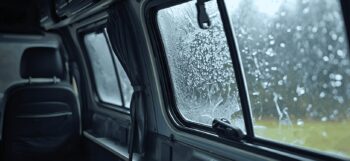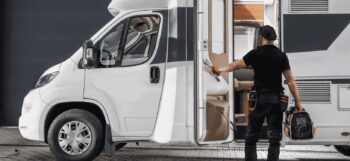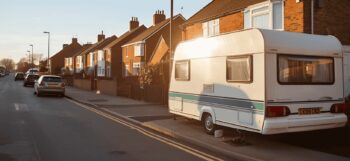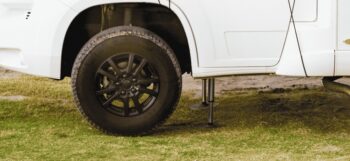One of the most important factors in safely towing your caravan is correct loading. An incorrectly loaded caravan can significantly affect stability, increasing the risk of accidents. For the safety of both your party and others on the road, here’s how to correctly and safely load a caravan.
What you need to know
The maximum weight you can legally tow depends on both your caravan and towing vehicle. Your caravan has a Maximum Technically Permissible Laden Mass (MTPLM)—the maximum weight it can be when fully loaded. Additionally, you must not exceed the noseweight limit of your towing vehicle.
While it is commonly recommended that the MTPLM should not exceed 85% of your car’s kerb weight, this is a guideline, not a legal requirement. Legally, you can tow up to the vehicle’s stated towing capacity, as found in the manufacturer’s handbook.
Some key weight-related terms to understand include:
- Mass In Running Order (MIRO) – The weight of the caravan as it leaves the factory, including standard fixtures and fittings. Remember to account for any extras added later.
- User Payload – The difference between the MIRO and the MTPLM. This is the weight allowance for all additional accessories, luggage, food, and appliances.
- Noseweight Limit – The maximum downward force that the caravan’s tow hitch can apply to the towing vehicle’s towball. This limit is set by the vehicle manufacturer.
To prevent overloading, consider using a weighbridge to check the total weight of your caravan. Some public weighbridges have closed, so check online for your nearest one. Even experienced caravanners should check their weight occasionally, as extra items can accumulate over time.
If your caravan was manufactured before 1994, be aware that the actual unladen weight can differ from the plated unladen weight. However, this issue can also apply to more recent caravans due to manufacturer updates.
Top Tips for Loading Your Caravan
- Store heavy items on the floor, preferably above the axle. This includes awnings, mains cables, and furniture. Never store heavy items under a fixed rear bed, as this can cause “snaking.”
- Medium-weight items should be spread out but kept as close to the axle as possible.
- Light-weight items, such as clothing, should go in the roof lockers to avoid affecting the caravan’s centre of gravity.
- Weigh everything individually to distribute the load evenly and ensure you stay within weight limits. Keep a record of item weights to avoid unnecessary re-weighing in the future.
- Use a public weighbridge to check that the MTPLM is not exceeded. Weighbridge locations can be found via the GOV.UK weighbridge locator
- Balance the caravan slightly towards the nose for stability. This doesn’t mean overloading the front, just ensuring it is slightly heavier than the rear.
- Pack essential items, only. Water and toilet containers should be transported empty—a litre of water weighs 1kg. Buy groceries at your destination instead of adding extra weight.
Choose lightweight equipment where possible. Plastic plates and cutlery are far lighter than traditional crockery, and lightweight gas bottles can reduce overall weight.

For a visual guide, this video for Bailey of Bristol shows you how to load a caravan correctly.
Do You Hold the Correct Driving Licence?
Since 16 December 2021, UK drivers who passed their test after 1 January 1997 no longer need to take a separate B+E test to tow heavier trailers. You are now automatically allowed to tow up to 3,500kg MAM (Maximum Authorised Mass) with a standard Category B licence.
For full details on towing licence requirements, visit the GOV.UK website.
Do I need insurance for a caravan?
Although caravan insurance isn’t a legal must-have, it’s a good idea to consider it. After all, caravans usually aren’t covered by car insurance. That means if you’re involved in an unfortunate incident—like an accident, damage or theft —and you don’t have specialist insurance, you could be left to cover the costs. But with caravan insurance, you can be covered for a variety of scenarios, whether your caravan is static or attached to the car.
Why choose Lifesure for caravan insurance?
We've been helping people with caravan insurance for over 20 years, so we know how to find a suitable policy for you and your caravan. You'll also get superb customer service at Lifesure. It's why we've earned the Feefo Platinum Trusted Service Award for five consecutive years.
Whether you're touring the UK or storing your caravan between trips, having insurance can help give you added peace of mind that you’re protected against risks. At Lifesure, our touring caravan insurance can help protect you against unexpected costs from theft, damage, or accidents while on the road. You can also add RAC caravan breakdown insurance for extra reassurance when you’re travelling.
Fill in our online form to get an instant quote or call us on 01480 402 460 and one of our team will be happy to help.
Disclaimer: The sole purpose of this article is to provide guidance on the issues covered. This article is not intended to give legal advice, and, accordingly, it should not be relied upon. It should not be regarded as a comprehensive statement of the law and/or market practice in this area. We make no claims as to the completeness or accuracy of the information contained herein or in the links which were live at the date of publication. You should not act upon (or should refrain from acting upon) information in this publication without first seeking specific legal and/or specialist advice. Arthur J. Gallagher Insurance Brokers Limited trading as Lifesure accepts no liability for any inaccuracy, omission or mistake in this publication, nor will we be responsible for any loss which may be suffered as a result of any person relying on the information contained herein.
FP522-2025











